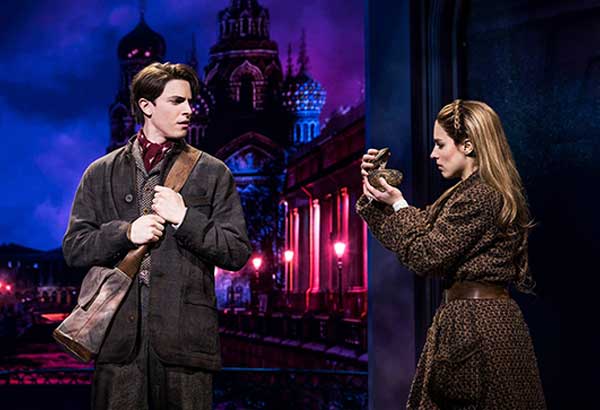Land of the past

Anastasia then and now: The Russian royal finds her way to the Great White Way with a Broadway incarnation that amplifies the source material’s political undertones.
A hit animated film back in the ’90s, Anastasia could easily hold its own against its Disney contemporaries. It centers on a young royal, Anastasia, who escapes the execution of the Romanovs during the Bolshevik Revolution. Years later, she is found to be living on the streets of St. Petersburg with amnesia and is roped in to assume the identity of the mythical Grand Duchess Anastasia as part of a ruse to convince her Grandmamma that she is alive and reclaim their family estate.
It turns out that — as with the stuff of legend, gratuity and man’s proclivity for the impossible — she was the genuine thing all along. You may remember the occasional think piece about the movie’s real-life protagonist, how Anastasia was still alive, or how, at one point, she supposedly ended up in the Philippines eating adobo. Bottom line: the idea of a real-life royal walking amongst us will always be titillating because, as Lorde says, “We’ll never be...”
I always thought Anastasia was pretty special. Apart from the iconic Journey to the Past, it had a knack for being highly theatrical. The scene with Rumor in St. Petersburg matched the breadth of the opening sequence in Beauty and the Beast, minus the bucolic small-town pageantry. The songs of Lynn Ahrens and Stephen Flaherty (Once On This Island and Ragtime) evoked a kind of epic-ness that rendered the film’s eventual stage adaptation moot and academic. Anastasia the Musical was only a matter of when.
Imagine my delight when I found out that after a long period of time, Anastasia the Musical was headed for the Great White Way. I wrote on Instagram that the opening bars of a song, a specific line, or a motif holds a strange resonance with audiences who have formed any remembrance or association with a certain work. You feel it in the theme song from The Addams Family, when you get excited and snap your fingers at the right intervals. You quiver at the sound of a helicopter in Miss Saigon, knowing you are about to witness an epic. With the stage version of Anastasia, because of its previous existence in animated form, I found myself latching on to elements that were familiar while feeling antagonistic towards ones that were not — songs and plot twists included.
In essence, watching Anastasia the Musical became a mental negotiation — between what I distinctly remember and, because of creative license, what I was made to forget. I wrote that when an opportunity for displacement arises in adaptation, it is the strength of the proposition or essentially “taste” that validates the material in service of one’s appreciation. For the stage version, I didn’t feel like the propositions were strong enough to displace my deeply rooted appreciation of the film.
Did I love Anastasia the Movie? Yes. Did I love Anastasia the Musical? Yes and no. The costumes I thought were spectacular, the performers magnificent, and the orchestrations full. But I thought the staging was too prosaic, especially its use of three LED screens, two of which rotated for a total of five. It is a tricky digital disruption, especially in the theater where, as evidenced by Peter Brook, an empty space can be magic in itself.
On one hand, you can spell it out for audiences and transport them from St. Petersburg to Paris without a hitch. On the other, there is the argument that theater is about imagination and trusting audiences to go on a journey with you logically and conventionally, which is why intelligent children’s shows like Matilda and Julie Taymor’s The Lion King are so successful.
There was also something problematic about the book. A new antagonist is introduced in place of Rasputin and Bartok. His name? Gleb Vaganov, a general of the Bolsheviks. Gleb is mandated to suppress any dissidents who might incite rebellion, what more that a Romanov still alive in St. Petersburg. And yet his inclusion in the story diminishes the show’s proclivity for magical realism. Instead, it amplifies the source material’s political undertones, possibly at the director’s behest, in response to animated films that dumb things down for its target audience, the youth. You’d never realize that the original Little Mermaid ends tragically if you only knew the Disney version. That, for me, is highly suspect.
Overall, I feel ambivalent about Anastasia’s stage version. With the potency of the show’s source material, not to mention an animated film that is well loved and is thus theatrical gold, the show seemed like it was altered to be more political than social, diminishing what always felt to me like a diamond in the rough. It was always my dream to see Anastasia in musical theater form. But with its current Broadway incarnation, I can’t help but feel that, perhaps, it was a dream better realized in another place and another time.















